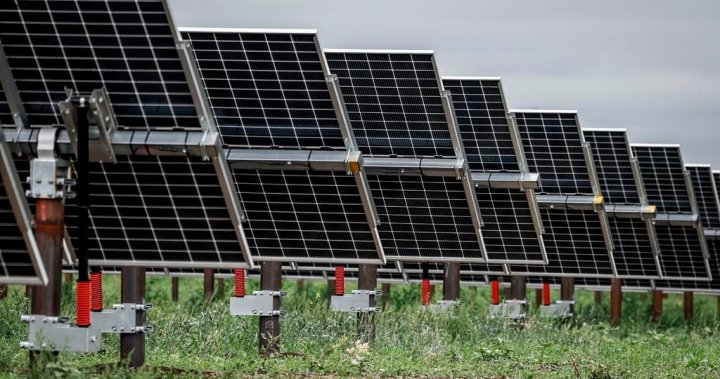After more than six months, Alberta’s moratorium on renewable energy projects will be lifted.
Earlier this month in Ottawa, Premier Danielle Smith confirmed the pause was going to end on the date that was originally announced: Feb. 29.
The pause was to allow the Alberta Utilities Commission (AUC) to conduct an inquiry into electricity generation in the province. The province said the AUC inquiry was to look at the classes of land renewable energy projects were installed on, their impact on vistas, reclamation security requirements for the renewable projects, and the impact of renewables on the electricity supply mix and reliability in the province.
One industry group said the moratorium set every renewables project in the province back by at least seven months. The Business Renewables Centre Canada (BRCC) claims it’s caused uncertainty for the industry in the province.
“It really created an opening for developers to start considering if their capital was better placed in other jurisdictions,” Jordan Dye, BRCC director, said. “Alberta just chose the worst moment, in my opinion, to launch this inquiry and a moratorium on projects.”
Recent numbers from the Canadian Renewable Energy Association (CanREA) show that, nationwide, renewables grew by 11.2 per cent last year, led by Alberta. The prairie province was host to more than 92 per cent of the country’s overall growth in renewable energy and energy storage, CanREA said.
After submitting a report to the province at the end of January, the AUC says it’s “awaiting further policy direction” from the province.
Get the latest National news.
Sent to your email, every day.
The province said the Jan. 31 report is only one part of the final report, which is expected to land on Minister of Affordability and Utilities Nathan Neudorf’s desk by March 29.
“Alberta has a strong renewable energy sector and we are committed to ensuring its ongoing success,” Neudorf said in a prepared statement. “I am confident that the pause will provide clarity for our partners in the renewable energy space, ensuring that Alberta remains a leader in renewable energy projects while meeting the needs and concerns of Albertans going forward.”
Neudorf’s office said more details about the policy changes would be made clear closer to the Feb. 29 lifting of the moratorium.
At the start of this year, Alberta only trailed Ontario in its wind and solar generation capacity, according to CanREA calculations.
CanREA said the pause and investor uncertainty is likely to have impacts on the industry in 2025 and beyond.
“Specifically, CanREA is tracking 8.3 GW (gigawatts) of projects under development in Alberta. Of these, 3.9 GW of projects had the potential to come online in 2025, along with a further 4.4 GW of proposed projects with later commissioning dates, which are all now at risk,” it said.
A recent paper by Kristina Pearson and Sara Hastings-Simon at the University of Calgary’s School of Public Policy said increased wind and solar generation can help reduce greenhouse gas emissions from natural gas power plants, and even out the amount those power plants are dispatched to make up for demand.
“When all approved projects are built, one-third of all hours could require less than 5,000 MW (megawatts) of firm dispatch, and we would start to see hours where renewable energy will exceed all demand,” the paper says.
The U of C authors said with the change in dispatch patterns and increase in renewable energy sources, “natural gas power plants are an affordable option for balancing variable renewable generation.
“However, in Alberta’s energy-only market, changes are required to reward the flexibility required to support growing renewable power,” Pearson and Hastings-Simon wrote.
Dye said he hopes any new regulations put on the renewables sector are also applied across the energy-generating industry, especially with 12 natural gas plants in the construction queue.
“Our industry has been treated differently than any other energy industry,” Dye said. “One of the foundational principles of Alberta’s energy market is that we’re agnostic to energy sources: we let the market decide what is the best to be built.”
© 2024 Global News, a division of Corus Entertainment Inc.


